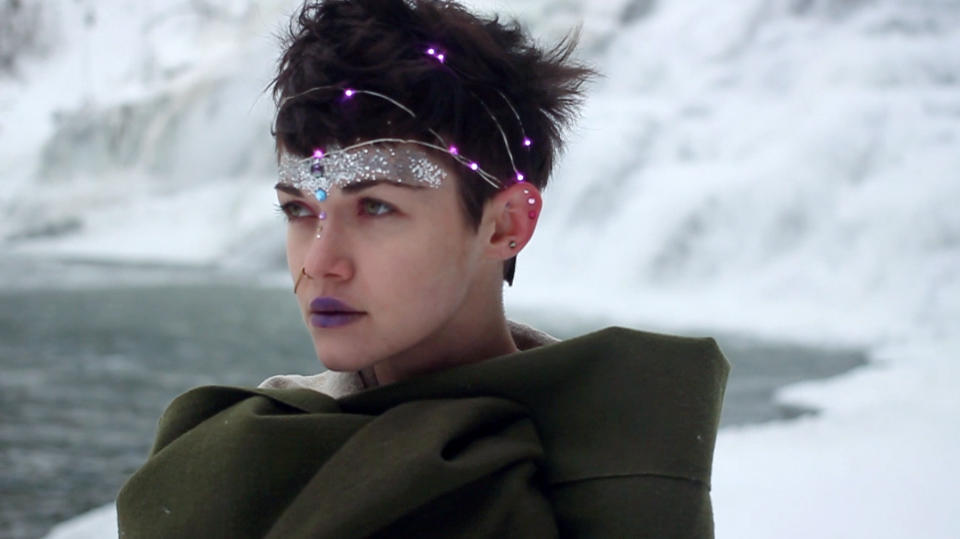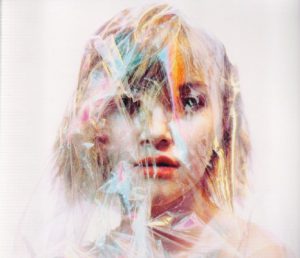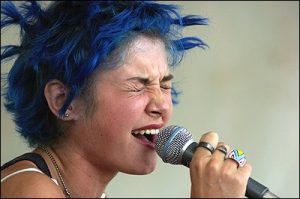From Punk to Poignancy with Maia Vidal in the Echoes Podcast.
Podcast: Play in new window | Download
Subscribe: RSS
Listen to the Maia Vidal interview above, or download it from iTunes.
Look at videos of Maia Vidal from around 2012, and she’s demure with a short pixie haircut, wearing a headband and strumming an autoharp. An accordion sits ready at her feet. But that’s not how Maia Vidal started. In 2004, as a 16-year old she was in a band called Kiev in Ithaca, New York, a 3 piece all female punk trio. Maia fronted the group, playing bass and sporting hair that ranged from bleach blonde to electric blue. Kiev were playing clubs and opening for bands like Bad Religion. Speaking over Skype from Barcelona, Maia relates the fateful call they got from an ad agency to be in an commercial series touting Coca Cola.
Vidal from around 2012, and she’s demure with a short pixie haircut, wearing a headband and strumming an autoharp. An accordion sits ready at her feet. But that’s not how Maia Vidal started. In 2004, as a 16-year old she was in a band called Kiev in Ithaca, New York, a 3 piece all female punk trio. Maia fronted the group, playing bass and sporting hair that ranged from bleach blonde to electric blue. Kiev were playing clubs and opening for bands like Bad Religion. Speaking over Skype from Barcelona, Maia relates the fateful call they got from an ad agency to be in an commercial series touting Coca Cola.
“And of course that was just very torturous for us”, quips Maia, “It was like oh my god, we’re such sellouts. The whole campaign was ‘Make It Real’. It was supposed to be us in real life more or less, and the fact is, it really was. The scenes in my bedroom and it’s my bedroom. Us driving in my car and it’s my car, you know. The shots of the basement and we’d go to a gig and it’s the place where we normally gigged. And all of the extras were our friends and families.”
After a change of name to Kievan Rus, they released a couple of albums, but Maia saw the writing scrawled on the club wall.
“The punk scene is kind of hard”, signs Maia. “My feeling was that I was going out there and I needed armor against the fans, I’m going out there for war, you know. . . I’m gonna do all my songs without even a breath in between and run off stage…and hope that they don’t throw bottles at me.” Looking at the videos on Youtube, Maia seemed pretty joyful, but the sensitive singer songwriter in her was getting gobbed on. “I couldn’t be myself because I felt like I had to fight for my place in such a real way that I couldn’t, relax into finding out who I was gonna be musically.”
After the band broke up, she traveled across Europe finally moving to Barcelona in 2009. She traded in the blue hair for something more sedate and her music became a lot quieter too. Even on a CD covering the punk group Rancid. As a punk, Maia couldn’t broach her sensitive side, especially while dodging bottles. But now, she can make a break-up album like You’re the Waves, although it’s actually an album of break-up and love songs.
“Well, very astute because the album is really a breakup and then getting together album”, explains Maia, “And ‘The Tide’ really is that overlap, actually. If you probe into it, ‘The Bed We Made’ was kind of sort of looking at the end of a relationship. It’s the bed we made and we have to lie in it or sort of get on with our lives type of feeling. It’s a love song where you really have no choice in it kind of feeling. This is a story that came my way, disrupted everything and I had to just sort of kind of like …the tide is pulling you out, just stop trying to fight it and flow”.
One of the most fragile songs on You’re the Waves is called ‘Infinity’. It has some unusual origins: Binaural beats. Those are two tones set left and right in the ears, beating alternately against each other. It’s used both in meditation and in psychological therapy.
“You have the headphones on and it’s two tones that are so similar that they start to influence your brain and can sort of make you have strange, trance-like states,” she explains. “It’s very psychedelic and interesting. I was actually listening to these things that were messing with my brain and sending frequencies to my brain while I was just a free flow stream of consciousness writing in my journal. It kind of happened that way. The fun thing is, with those songs, I listen to them and I don’t even necessarily recognize them as mine.”
Maia Vidal has gotten fluent enough in Spanish that she dreams in the language. That shaped a pair of songs. “When I started writing  this, I started dreaming in Spanish, and really be thinking in Spanish. I felt like I sang different. My voice had a slightly different timbre and the sort of themes that I wanted to write about were different Luna and El Azar are the ones I wrote and both are extremely minimal. Luna is the moon and it’s about this blood moon. It’s thirsty and El Azar is about chance and randomness and fate, as you say, philosophical”.
this, I started dreaming in Spanish, and really be thinking in Spanish. I felt like I sang different. My voice had a slightly different timbre and the sort of themes that I wanted to write about were different Luna and El Azar are the ones I wrote and both are extremely minimal. Luna is the moon and it’s about this blood moon. It’s thirsty and El Azar is about chance and randomness and fate, as you say, philosophical”.
There is an open, childlike quality to Maia Vidal’s voice, even when she’s singing a sad song. But you can also hear the influence of singers like Billie Holiday. “I liked her way of being able to sing really devastatingly sad stuff with this lilt and like little smile kind of feeling,” reveals Maia. “That there was this way to convey kind of dark material without melodrama. And I felt like she did that really through her voice through the subtlety of her tremolo or the sort of lilt of it, and I just you know, I went very deep into that”.
Maia Vidal doesn’t sound like Billie Holiday anymore, nor another hero, Etta James. She’s on her own path. “And then it was a question of finding what my voice is gonna end up sounding like, and I think that that’s getting more clear to me now”, discloses Maia.
You can hear Maia Vidal’s voice and songs on her latest album, You’re the Waves, on Crammed Disc.

